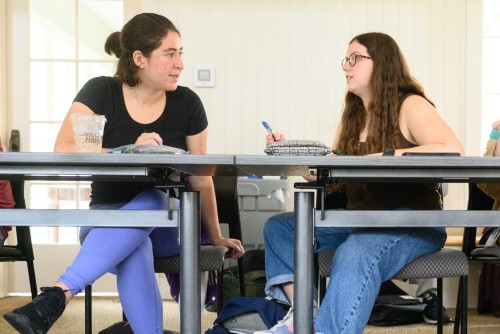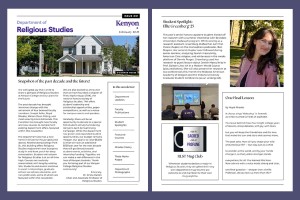The study of religion at Kenyon is intrinsically global and interdisciplinary. The faculty’s areas of expertise range from the history of early Christianity to Buddhist philosophy, from Sufi practices to Hindu diaspora in the Caribbean, and from ancient Judaism to religion and sci-fi, gender and sexuality, and transhumanism. The department’s courses use diverse disciplinary approaches, including philosophy, sociology, history and anthropology, to think through questions about how different religious traditions have intersected with themes as varied as gender, social and political power, nature, death, communal life, psychology and concepts of the transcendent.
Snapshot of the past decade and the future
Enjoy a glimpse of Religious Studies at Kenyon and learn more about our plans for the future in our latest departmental newsletter.
Religious Studies at Kenyon
Why study religion at Kenyon College? Professor Joy Brennan explains the interdisciplinary and global potential of coursework in religious studies.
Theta Alpha Kappa
Theta Alpha Kappa (TAK) is a national honor society that seeks to recognize the academic achievements in religious studies. In addition to encouraging the activities of local chapters, TAK maintains a vigorous national program of scholarship awards and fellowship competitions.
Featured Courses
Islam’s Diverse Paths
The religion of Islam is a diverse tradition that includes more than a billion adherents across the globe and dominates a region stretching from Morocco to Indonesia. Study the development of Islam and Islamic institutions from the time of the Prophet Muhammad through the emergence of the Sufi tradition in the late medieval period.
Meanings of Death
In all cultures, the idea of death and dying shapes the imagination. Explore the symbols, interpretations and practices centering on death in diverse religious traditions and historical periods, using religious texts, art, literature and more to examine the questions death poses for the meaning of existence.
Religion for Robots: Cyborgs, Sci-Fi and Posthumanism
What does it mean to be human? How have various changes in technology and media affected the practices and meanings of religion? What role would religion play in a posthuman present/future? Course readings—including recent work in post/transhumanist theory along with science fiction—interrogate the categories of religion and humanness.
Modern Buddhism
How have colonialism and its aftermath influenced Buddhist institutions and practices? How does Buddhist thought apply to theories of race, gender and sexuality? This course examines key Buddhist people, concepts and movements around the world from the 19th to the 21st centuries.



